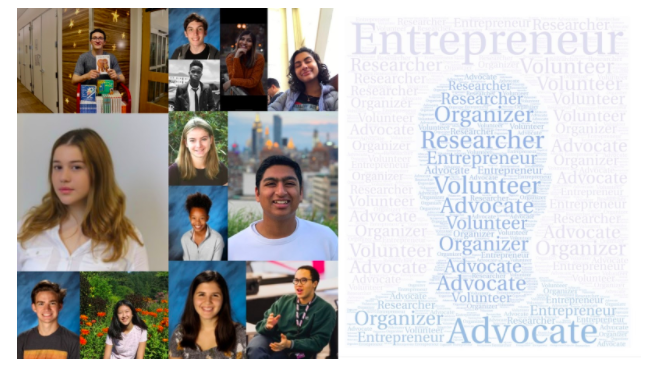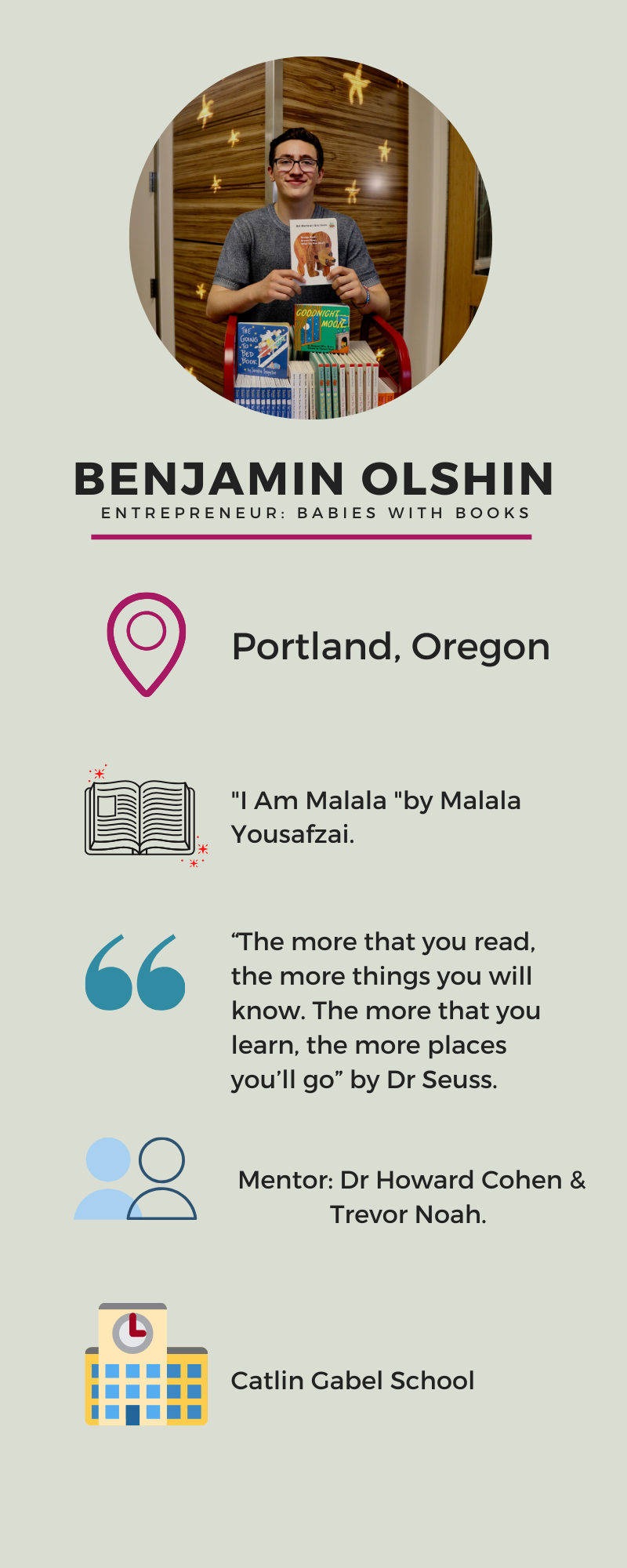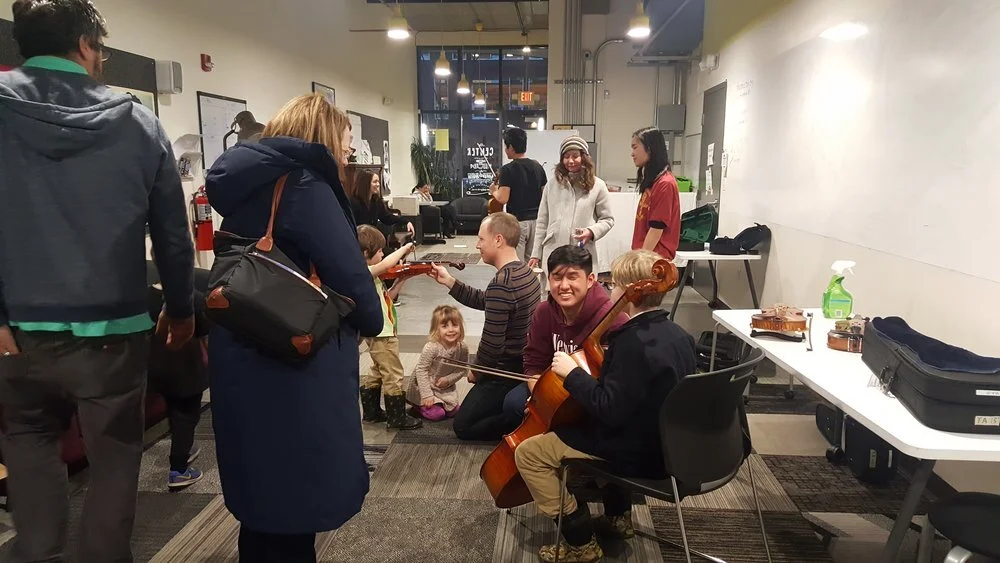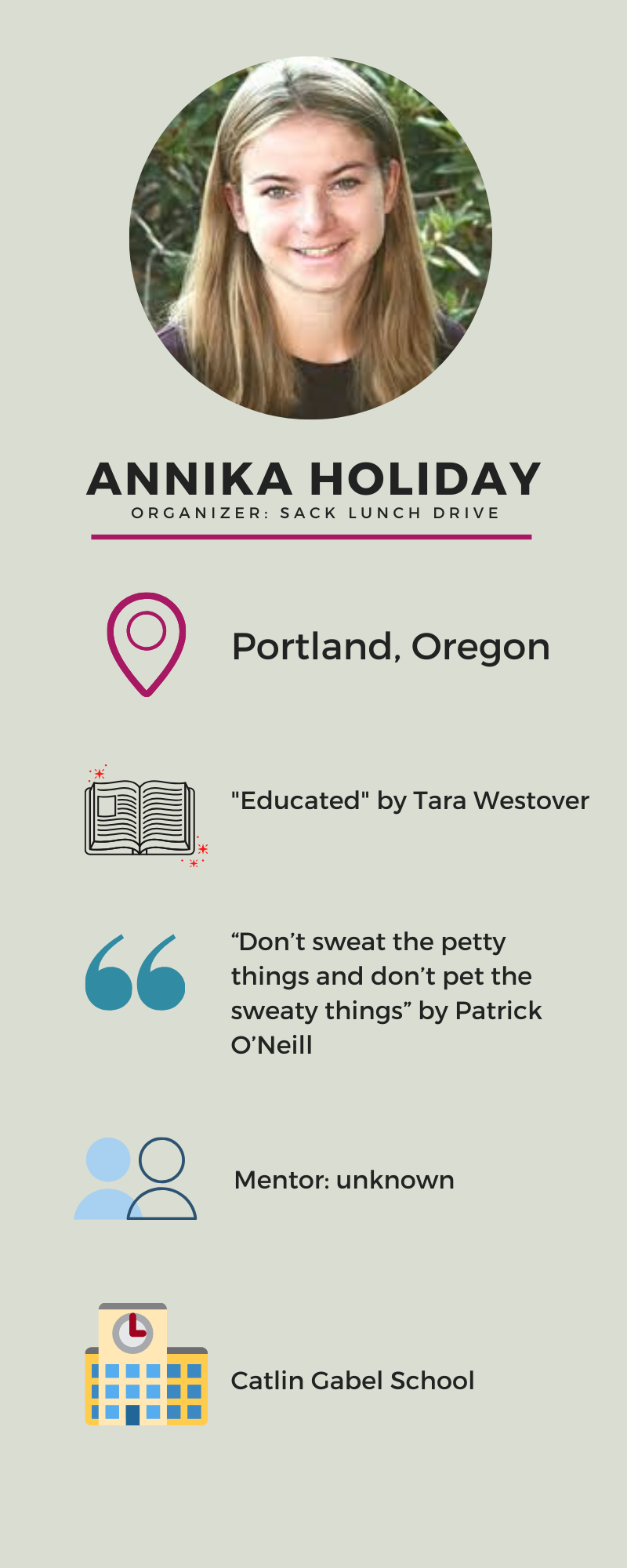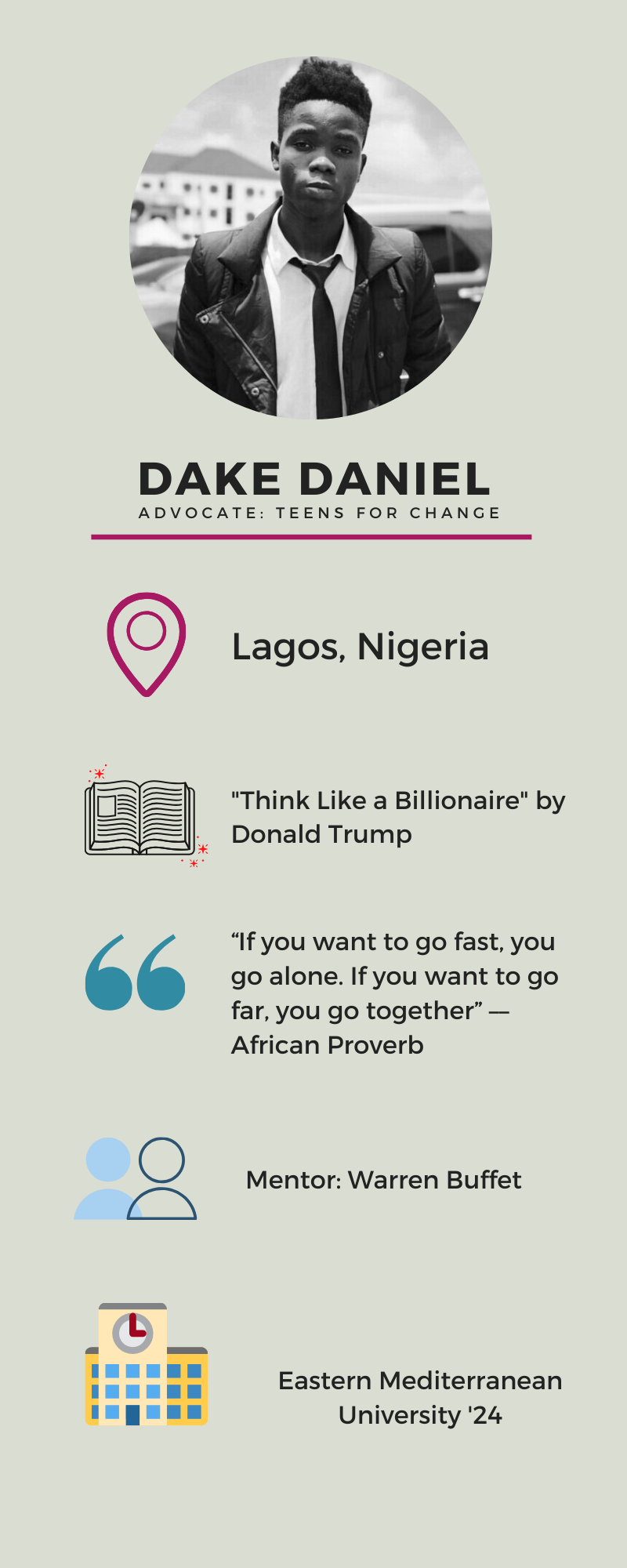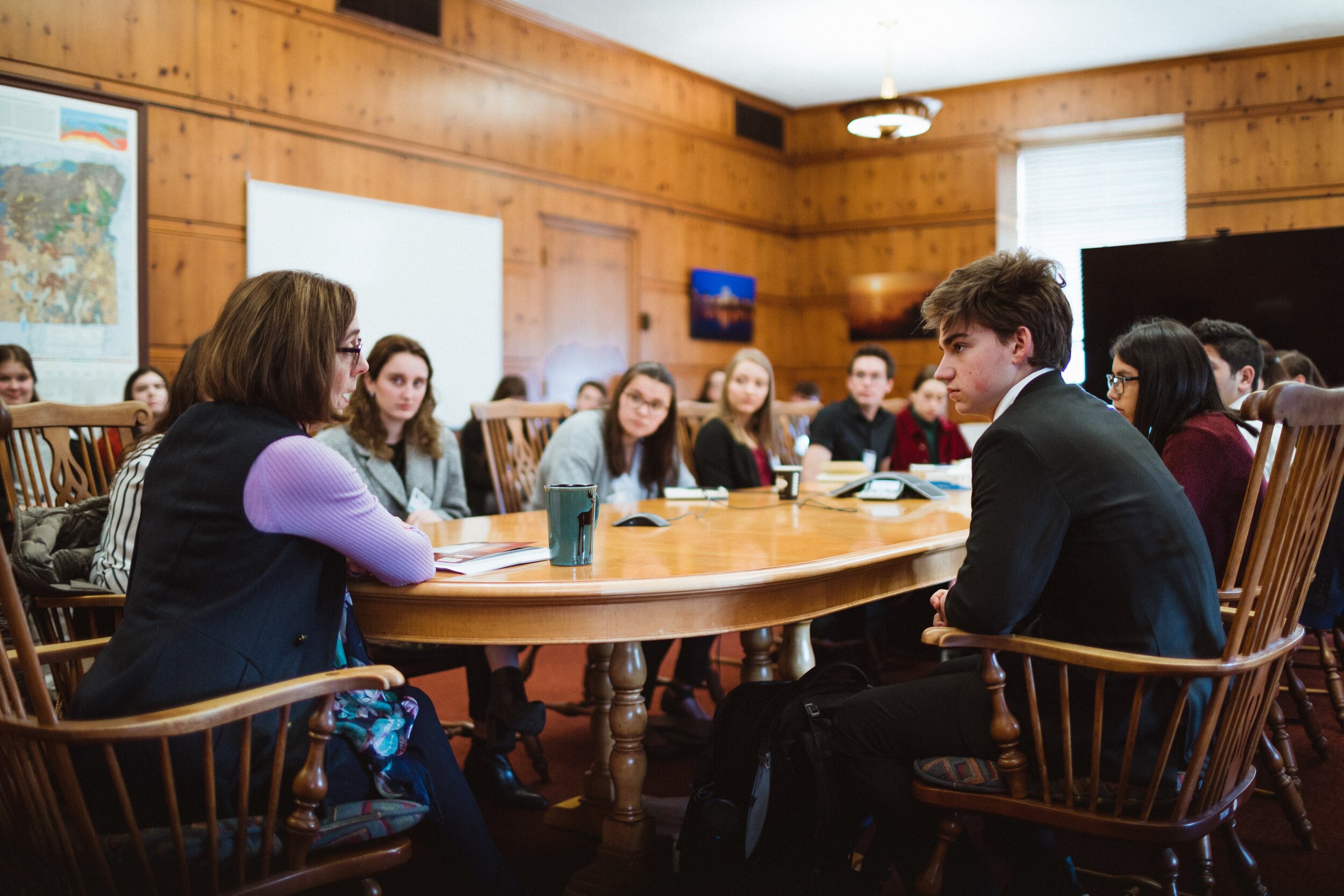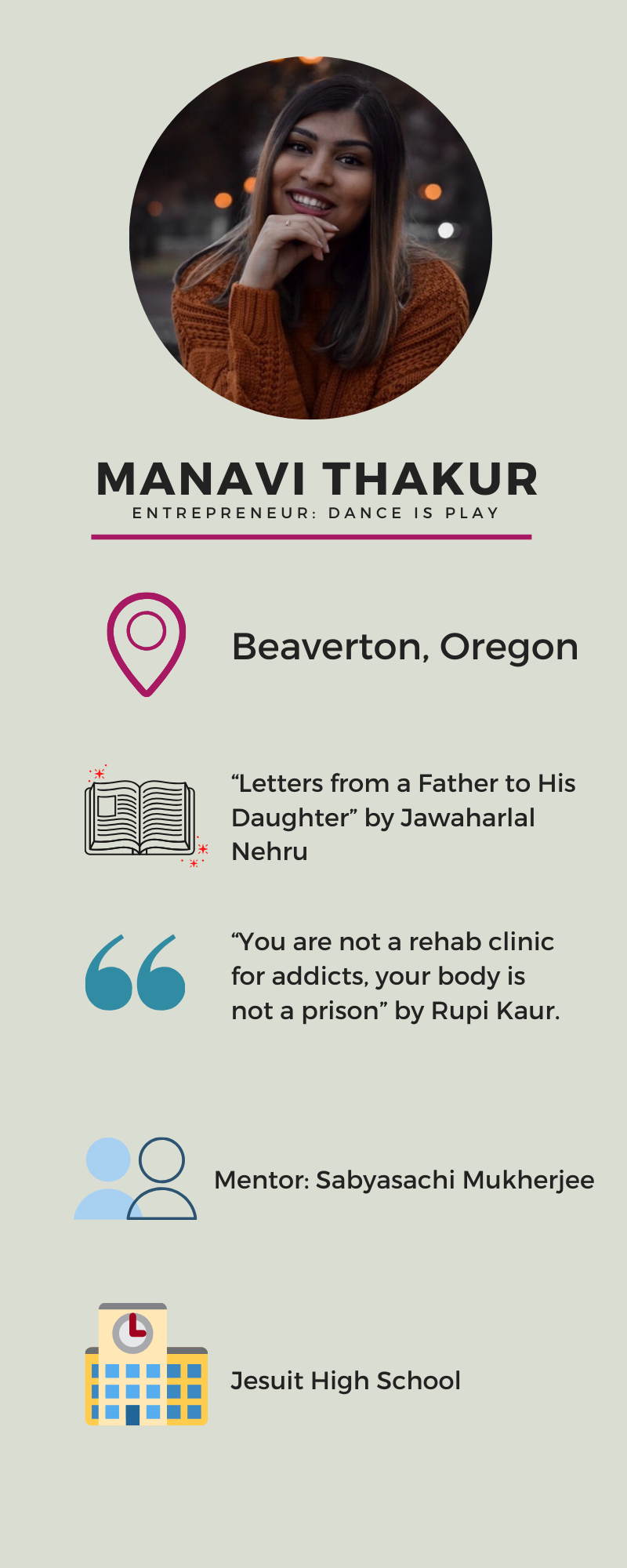Students build companies, form community, and help others while remaining socially distanced
By Britton Masback ‘20 and Advay Koranne ‘20
Graphics courtesy of Advay Koranne ‘20.
While many of us are stuck at home scrolling through Tik Tok or watching reruns of our favorite television shows, there is a strong contingent of students who are creating meaning through a range of projects, organizations, and initiatives despite being quarantined. These pioneering individuals are pursuing their passions, responding to community problems COVID-19 has exposed, and finding ways to stay connected despite the social divide.
In order to share their stories and in hopes of inspiring others to pursue a project of interest, we reached out to a range of students from Catlin Gabel School (CGS), the broader Portland metro area, and all the way to Lagos, Nigeria, and Tbilisi, Georgia. Read on to hear what motivated their projects, the challenges they are facing during COVID-19, and the creative ways these teens are managing to make a difference.
Benjamin Olshin: Entrepreneur & Advocate
What is the name and mission of your nonprofit?
Babies With Books (BWB) is a teen-led early literacy organization that helps families cope with the stress of having a critically ill baby in the Neonatal Intensive Care Unit (NICU). We provide families with engaging books to read and keep, educate parents on how and why to read with their infant, and share our NICU reading program across the country and beyond.
What inspired/motivated you to start the project?
Olshin delivering books. Photo Courtesy of Babies With Books.
While volunteering at our city’s children’s book bank erasing crayon marks and unfolding crumpled pages, I learned that early literacy is critical for school success. I was distressed to learn that many low-income families own no books and that many families do not know that reading together is important. I learned that a handful of NICUs around the country were beginning to establish reading programs. Through research, I learned that infant reading promotes brain development and is especially important for NICU babies.
What is a brief summary of your project?
BWB empowers families to engage in their sick baby’s NICU care by providing parents engaging books and encouraging them to read with their baby to support their baby’s brain development. In combination with our welcome packet program, we provide books and early literacy education to 100% of reproductive and child health (RCH) NICU families. We have raised nearly $30,000 to fund and grow BWB. Our program has gained local and national attention and we are sharing our model with 30+ NICUs locally and abroad from Anchorage, Alaska to Houston, Texas, to Doha, Qatar.
How have your operations changed as a result of COVID-19? How are you mitigating that change?
Due to the COVID-19 pandemic, we have canceled our in-person book rounds and are now focusing on our welcome packet program and continuing to develop and share our work with other NICUs. Thanks to the RCH NICU’s dedication, we continue to serve 100% of NICU families through welcome reading packets.
What are your future goals?
Our goals are to share our NICU reading program as a model for hospitals across the globe to adopt or adapt at their hospital. To do this, we are developing a guide with a detailed summary of our work for other hospitals to use to implement a similar program. This guide can be requested at this link and more information can be accessed on our website, babieswithbooks.org.
How can people get involved?
You can donate used books for our sibling book library and book nooks at NICU events. You can also sew or otherwise provide blankets for us in our welcome packets (cheerful fabrics and size of ~20” wide by 26” long work well) and/or donate funds to support our work at babieswithbooks.org/contact.
Amy Wang: Entrepreneur & Advocate
What is the name of your non-profit?
I am the Executive Director of Project Prelude. Project Prelude is a student-run nonprofit organization that aims to expand the accessibility of music education by connecting high school musicians with students from economically disadvantaged schools through free music lessons.
What inspired you to start this project?
I joined Project Prelude because I believe that everyone should have access and opportunities to experience music education. Playing an instrument has been one of the most joyful and valuable experiences in my life, and I wanted to share that with other kids.
What are your current initiatives as an organization?
Project Prelude working with children and youth at the CENTER in north Portland. Photo Courtesy of Project Prelude.
Currently, we run after-school group lesson programs at schools in the Portland area teaching flute and violin to fourth and fifth grade students. Our classes are completely free, and we provide instruments and supplies for our students. We also run a private lesson program, in which our students have the opportunity to take free private lessons from experienced musicians.
How can people get involved?
If you are interested in becoming a volunteer with Project Prelude, please fill out the volunteer interest form. Also, feel free to look at our website, projectprelude.org or email me at wanga@catlin.edu with any questions.
Annika Holiday: Advocate
Annika Holliday and her family packing lunches. Photo Courtesy of Annika Holliday.
Mariam Gogidze: Entrepreneur & Organizer
What is the name and mission of your group?
The name of my project is International Buddy. The main idea is to connect students from different cultures and make friends who come from different countries. The college I attend, Kaplan International College London, is international and very often we still have a problem where students from the same country stick together and don’t make many international friends even though the environment is very international.
Why did you want to create this resource for your peers?
I am an international student, and there are only two other people in my entire college from my country of Georgia. This has forced me to meet people of all backgrounds and cultures. The ability to create international friendships has been critical for me and it has given me great insights into other cultures. It’s all about building friendships that are helpful for us now and into the future.
How is your project impacted by COVID-19?
Initially our project was going to incorporate online media, however, there were plans to hold in-person events. Now, we switched to online completely. So we are working with social media posts and our website, trying to get our members to share their experiences and stories online. We also have Zoom group calls with newcomer students — who were supposed to start in the spring — to help acclimate to the college life.
What does the future hold for your project?
This is the first time we are doing the project. Right now, it’s a small group of us, but for the future, we are looking to expand our team. We also want to hold some large events with speakers to highlight the importance of making connections and building international friendships.
How can students get involved with your work?
We send emails to students which is our main form of communication. However, we also share information over Facebook, Instagram and other social platforms. In either case, we ask new students to fill out an intake form of sorts, and then match them with people based off their interests.
Our full interview with Mariam can be found here.
Taji Chesimet: Entrepreneur & Advocate
What is the name of your non-profit?
I run an organization called Youth Educating Police. We are a youth run non-profit founded in 2017. We conduct community-based work to engage with the police bureau and improve long term relationships.
What inspired you to start the project?
It was originally started in the spring of 2017 at Startup Camp — a weekend long program that brings together students for the purpose of creating companies and organizations. After that initial weekend, the project didn't have much momentum. Soon after though, I met Britt Masback (a co-author of this article) in the fall of that year and ironically fell upon the project. It also really connected to my larger goal of working in race and social justice work, and it tied into my own experiences as someone who has experienced negative interactions with police officers.
Photo Courtesy of Britt Masback.
What is the primary goal of Youth Educating Police?
We initially started by engaging with the community and understanding what is wrong and what perspectives young people have about police officers. We then wanted to understand what tactics police officers have previously used that worked and what didn't. We also wanted to know how police officers can change on a large scale when dealing with something like implicit bias and things they don't necessarily get trained on. We worked with the chief and then with the training division to develop something that would work for Portland police officers.
How can people get involved?
For the first few years, YEP’s outreach efforts have been focused on engaging people with the explicit purpose of understanding their perceptive and building our programming based off these perspectives. Going forward, as Britt and I go off to college, we still want to have a strong Portland base and we are looking for people to help us. If you’re interested in the work, don’t hesitate to reach out.
What are your future goals?
The biggest thing we have built is social capital with people in Chicago, Philadelphia, Seattle, and Florida, and in those respective areas we hope to engage already existing NGOs (Non Governmental Organizations), and we hope to expand.
Arjun Jain: Researcher
What type of research are you exploring?
This year I completed research in the field of biomedical research and specifically, breast cancer research.
What inspired you to start the project?
I have always been drawn to science research and enjoyed using scientific concepts to solve real world problems. I have been drawn to biology and I decided to tackle breast cancer –– which is one of the most common forms of cancer –– and see if I can contribute.
What is a brief summary of your project?
The leading cause of breast cancer death is when the cancer cells develop resistance to the treatment, and I wanted to understand the genetic factors that cause resistance.
How can other young people pursue their research interests?
The main thing is to figure out the field that you are passionate about whether that be math, computer science, physics, or biology. You can either do your own project at home or at school, or if you want to do a bigger project, you can contact places such as Reed College, OHSU, PSU and local universities that have nice research facilities and mentors.
What are your future goals?
Right now, I plan to major in biomedical engineering. I want to be a biomedical researcher and work at a big biotech company.
Arjun Jain at the Intel International Science Fair. Photo Courtesy of Arjun Jain.
Dake Daniel: Advocate
Alana Nayak: Community Advocate
What is the name of your project?
I’m a part of the Multnomah Youth Commission (MYC). Essentially we’re the official youth policy body for Multnomah County and the City of Portland.
What is a brief summary of your project?
I serve on the Youth Against Violence (YAV) subcommittee where we put on community events and gatherings and gather data on the experiences of community members affected by violence. Right now we are partnering with a number of community organizations to compile data and develop policy recommendations to present to the Mayor on youth perceptions of police.
What inspired you to start your project?
I’ve been a part of MYC for two years now and the reason I joined was mainly to connect with other youth — especially youth of color —and solve existing community problems perpetuated by police and discriminatory laws.
How have your operations changed as a result of COVID-19?
It’s challenging to connect with individual community members or community organizations because we don’t necessarily have things we can physically do in the community. It’s just about finding ways to continue without connecting directly with these communities. We’re continuing projects that have less to do with specific experiences of community members and more rely on existing data and information that we can bring to the mayor.
What are your future goals?
I would love to see some impact come from the data we’ve gathered on police perceptions. I worked really hard to gather the data from the community, and I would really like to see it distributed to the public. One major part of this will be developing recommendations in coordination with the Portland Commission on Community Engaged Policing.
How can people get involved with your work?
The MYC always seeks community feedback, especially when we work on projects like the police initiative YAV is working on now. Feel free to email me at alananayak123@gmail.com if you are interested in hearing more about our work and have ideas for our policy recommendations. And consider applying to be a part of the MYC in the future!
Eamon Walsh: Campaign Operative
What is keeping you busy over the break?
I’m a member of the senior staff of Ben Bowman for Oregon, which is a state senate campaign for Oregon’s Senate District 18. We are running a primary campaign against an incumbent who is also the majority leader of the Senate, Ginny Burdick. I’m personally doing a lot of phone banking and also generally working on messaging for the campaign.
How did you become involved in campaign work?
It’s a long story for sure, but it all started during my freshman year. I joined a program called the Capitol Ambassadors Program, which meets three to four times a year for discussions around politics and includes an annual trip to Salem to meet with the governor and other legislators. Ben Bowman actually started this program, and so I met him my freshman year. While I didn’t join his school board campaign in 2018 because of my location, it was a natural fit to join his state Senate campaign this time around as it encompassed where I live.
What has changed for the campaign as a result of the pandemic?
Walsh talking to Kate Brown. Photo Courtesy of Eamon Walsh.
The pandemic was definitely a huge blow for us because our strategy was to have a grassroots movement, going door to door. Because of the stay-at-home order, we transitioned to a phone banking model full time. We’ve also organized wellness checks where we use our phone banking system to reach out to constituents and connect people with resources.
What do you like most about working on political campaigns?
The reason I like working in politics is because it’s the place where you can affect the most people at once and do the most good. But you can’t do that unless you elect the right people. So that’s why I like working on campaigns. Campaigns are like a 400-meter race; it’s not a long-distance or short-distance run, but you’re running as hard as you can for the whole thing.
How can people get involved with either your campaign or politics in general?
If you know me, you can always reach out to me personally. You can also learn more about our campaign on our website or social media platforms. We welcome all volunteers and donations. In terms of general engagement with politics, I definitely recommend the Capital Ambassadors Program. Not everyone in the program is a political nut like me, so there’s room for everyone. I also recommend that students get involved in Junior State of America or Model United Nations, which is a great way to learn, debate and make connections. Finally, read the news and be active.
Our full interview with Eamon can be found here.
Bianca Haldorsen: Entrepreneur & Organizer
What is the name of your project?
I’m part of a student-led nonprofit organization, Global Youth Entrepreneurs, and we’re trying to unify the power of entrepreneurship and forge alliances between young people across the world. My specific project right now is called the GYE Summer Entrepreneurship Accelerator, which will take place in August of this year.
What is a brief summary of your project?
Photo courtesy of Global Youth Entrepreneurs.
The summer accelerator program is working to cultivate entrepreneurship skills for high school students through three days of workshops, lectures, speakers, real world experiences. Students will learn business and entrepreneurship concepts like customer validation and creative ideation and will gain an introduction to key industry leaders here in Portland.
What have you achieved thus far?
We have definitely had a lot of time to work on this project and so we’ve been able to find an event space where this will be held, develop an itinerary, and reach out to the speakers and program partners needed to make this event a success. We’ve also worked on our marketing materials like a one-pager, website and flyer which will allow us to start our outreach push very soon.
How have your operations changed as a result of COVID-19?
A big challenge has been finding that motivation to start and do something productive with the project. A lot of times it’s easy to tell ourselves there isn’t much we can do because of quarantine, but it’s really helpful, in our case, to be able to lean into our other group members and use regular meetings to hold each other accountable. The most significant organizational challenge has been scheduling a date for the event, which keeps getting pushed back. But we can do a lot of great preparatory work, from developing relationships with new program partners to formulating marketing materials for student outreach.
What inspired you to start this project?
Myself and a few other co-directors attended a startup camp event that was held right here at Catlin Gabel, and we all found a lot of passion and investment in the startup process and that’s where the interest in this summer program was sparked as an organizing team.
How can people get involved?
For the summer program, students are welcomed to check out our website or they can email me with any questions at haldorsenb@catlin.edu. We will be starting outreach for all Portland area schools shortly. And if you’re really interested in joining the organization we could probably find you a spot, just please send me or our team an email.
Rachel Yoken: Literacy Advocate
Manavi Thakur: Entrepreneur & Advocate
What is the name of your non-profit?
What inspired you to start the project?
I wanted to find a passion which combines my love for dance and my love of service, and cultural appreciation. I also wanted to combine it in a way where I can give to my community.
What is a brief summary of your project?
Dance is Play is an established 501(c)(3) to promote dance and cultural acceptance through different forms of dance. I started it as an after-school program in elementary schools to instill the values of cultural appreciation early on. The goal is to get students active, motivated, and aware of different cultures.
How have your operations changed as a result of COVID-19? How are you mitigating that change?
It has been a detrimental impact because some of the work is behind the scenes, website forms, and such, but the crux of the work is working with kids and that part is greatly impacted. I used to teach dance at different elementary schools and a lot of these programs have been cut –– not an ideal situation.
How can people get involved?
You can visit the Dance is Play website to find ways to get involved.
What are your future goals?
I would like to open additional chapters across the United States. I have talked with people in New York and Texas and received interest. I also hope to continue Dance is Play when I go to college and work with people there.
Zachary Robinson: Maker
3D Printed Face Shield. Photo courtesy of Zachary Robinson.

